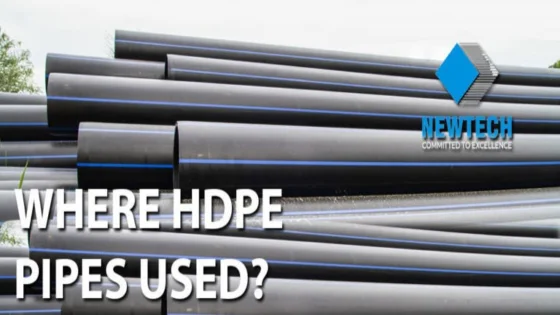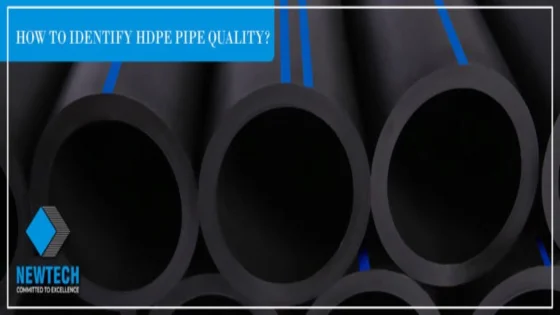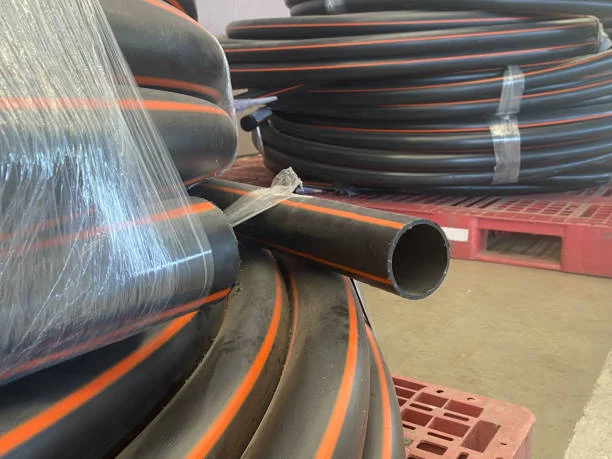Where are HDPE Pipes Used?

What is an HDPE Pipe?
HDPE pipe is made of high-density polyethylene, a type of plastic. It is safe, durable, and cost-efficient. HDPE pipe is a popular choice for many reasons. It is durable and can withstand high temperatures and pressures. It is also corrosion-resistant and chemical-resistant. HDPE pipe is available in a variety of sizes to meet the needs of different applications.
Where are HDPE Pipes Used?
HDPE pipes are commonly used in a variety of settings, both commercial and residential. Some of the most common places you’ll see HDPE piping are in water distribution and treatment, as well as gas distribution. HDPE is also a popular choice for sewers, thanks to its resistance to corrosion and cracking. Additionally, HDPE pipes are often used in agricultural settings for irrigation and drainage.
HDPE pipes have a long lifespan and are resistant to the most common forms of wear and tear. This makes them an ideal choice for many applications. When you need a pipe that will last, HDPE is a smart option.
Types of HDPE Pipes

There are a few different types of HDPE pipes that are available on the market. The most common are listed below.
Sewer pipe:
A sewer pipe is designed for transporting wastewater and sewage from homes and businesses. It is made from HDPE plastic to resist corrosion and cracking.
Water pipe: Water pipes are used to transport clean water from treatment plants to homes and businesses. They are made from HDPE plastic to resist corrosion and cracking.
Gas pipe:
Gas pipes are used to transport natural gas from production sites to consumers. They are made from HDPE plastic to resist corrosion and cracking.
Irrigation pipe:
Irrigation pipes are used to transport water from rivers and lakes to agricultural fields. They are made from HDPE plastic to resist corrosion and cracking.
Advantages of HDPE Pipes
HDPE pipes have several advantages over other types of pipes. Some of the most notable include:
- Corrosion resistance: HDPE pipes are resistant to most forms of corrosion, making them a good choice for underground applications.
- Resistance to cracking: HDPE pipes are resistant to cracking, making them a good choice for cold climates and other harsh environments.
- Long lifespan: HDPE pipes have a long lifespan and are less likely to need repairs or replacements.
- Low maintenance: HDPE pipes require very little maintenance, making them a hassle-free choice for many applications.

HDPE pipes, renowned for their durability, versatility, and resistance to corrosion, find extensive use across various industries and applications. From water distribution systems to sewage management, industrial processes, agriculture, and infrastructure development, HDPE pipes offer reliable performance in diverse environments. Their ability to withstand soil movements makes them ideal for underground installations, while their suitability for conveying chemicals and slurries makes them valuable in industrial settings. Moreover, HDPE pipes contribute to sustainable practices due to their recyclability, aligning with projects focused on environmental impact. With stringent safety standards met, HDPE pipes are a trusted choice for transporting drinking water, ensuring both quality and safety.
Frequently Asked Questions About Where HDPE Pipes Used?
Q1: Where are HDPE pipes commonly used?
A1: HDPE pipes find widespread use in various applications, including water supply systems, sewage and wastewater management, industrial processes, agriculture, and infrastructure development.
Q2: Can HDPE pipes be used for underground applications?
A2: Absolutely. HDPE pipes are ideal for underground installations due to their durability, corrosion resistance, and ability to withstand soil movements, making them a preferred choice for water and gas distribution systems.
Q3: Are HDPE pipes suitable for industrial applications?
A3: Yes, HDPE pipes are extensively used in industrial settings for conveying chemicals, slurries, and other materials. Their resistance to corrosion and versatility make them valuable in industrial processes.
Q4: In what construction projects are HDPE pipes commonly employed?
A4: HDPE pipes are commonly used in construction projects for water and sewer systems, stormwater management, and geothermal applications. Their adaptability to different terrains makes them valuable in diverse construction settings.
Q5: Are HDPE pipes environmentally friendly?
A5: Yes, HDPE pipes are considered environmentally friendly. They are recyclable and contribute to sustainable practices, making them a responsible choice for projects with a focus on environmental impact.
Q6: Can HDPE pipes be used for transporting drinking water?
A6: Absolutely. HDPE pipes are approved for use in drinking water systems. They meet stringent safety standards and are a reliable choice for ensuring the quality and safety of drinking water.
Q7: Do HDPE pipes require special installation techniques?
A7: While HDPE pipes are versatile and easy to install, proper installation techniques are crucial. Common methods include butt fusion, electrofusion, and socket fusion welding. Following recommended procedures ensures optimal performance.

